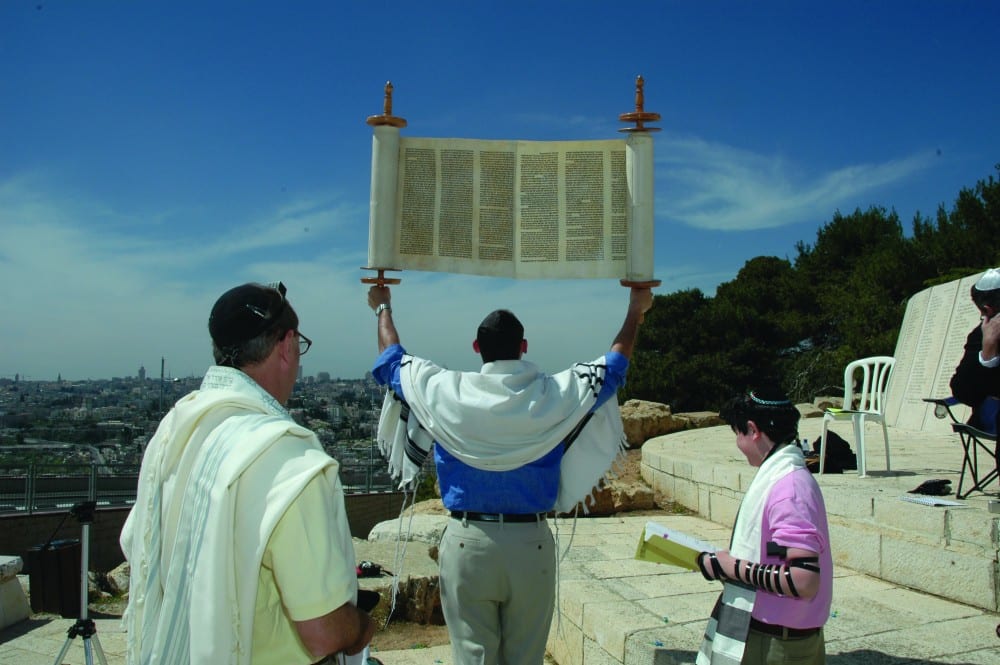
TORAH
NEVI'IM
KETUVIM
Chapter 21
Translation and Transliteration of
Listen to this chapter in Hebrew:
- Commentary
- Buy E-book
- Buy the Israel Bible
1If, in the land that Hashem your God is assigning you to possess, someone slain is found lying in the open, the identity of the slayer not being known,
kee yi-ma-TZAY kha-LAL ba-a-da-MAH a-SHER a-do-NAI e-lo-HE-kha no-TAYN l'-KHA l'-rish-TAH no-FAYL ba-sa-DEH LO no-DA MEE hi-KA-hu
אכִּי־יִמָּצֵא חָלָל בָּאֲדָמָה אֲשֶׁר יְהֹוָה אֱלֹהֶיךָ נֹתֵן לְךָ לְרִשְׁתָּהּ נֹפֵל בַּשָּׂדֶה לֹא נוֹדַע מִי הִכָּהוּ׃
![]() 21:1 In the land that Hashem your God is assigning you
21:1 In the land that Hashem your God is assigning you

Rabbi Joseph B. Soloveitchik (1903-1993)
The axed heifer is one of the few biblical commandments that can be performed only in Eretz Yisrael even though it is not an agricultural law. Rabbi Joseph B. Soloveitchik explains that the reason for this is that this law is incumbent on the ‘Congregation of Israel,’ not on individual members of the nation, and the Israelites are only considered the ‘Congregation of Israel’ when residing in their land. This highlights the centrality of the Land of Israel to the People of Israel: They are considered the Congregation of Israel in every sense of the term only when they live in their land. The ability to fulfill national biblical commands such as this is one of the reasons it is so important for Jews from all over the world to come on aliya, to move to Israel.
2your elders and magistrates shall go out and measure the distances from the corpse to the nearby towns.
בוְיָצְאוּ זְקֵנֶיךָ וְשֹׁפְטֶיךָ וּמָדְדוּ אֶל־הֶעָרִים אֲשֶׁר סְבִיבֹת הֶחָלָל׃
3The elders of the town nearest to the corpse shall then take a heifer which has never been worked, which has never pulled in a yoke;
גוְהָיָה הָעִיר הַקְּרֹבָה אֶל־הֶחָלָל וְלָקְחוּ זִקְנֵי הָעִיר הַהִוא עֶגְלַת בָּקָר אֲשֶׁר לֹא־עֻבַּד בָּהּ אֲשֶׁר לֹא־מָשְׁכָה בְּעֹל׃
4and the elders of that town shall bring the heifer down to an everflowingwadi, which is not tilled or sown. There, in the wadi, they shall break the heifer's neck.
דוְהוֹרִדוּ זִקְנֵי הָעִיר הַהִוא אֶת־הָעֶגְלָה אֶל־נַחַל אֵיתָן אֲשֶׁר לֹא־יֵעָבֵד בּוֹ וְלֹא יִזָּרֵעַ וְעָרְפוּ־שָׁם אֶת־הָעֶגְלָה בַּנָּחַל׃
5The Kohanim, sons of Levi, shall come forward; for Hashem your God has chosen them to minister to Him and to pronounce blessing in the name of Hashem, and every lawsuit and case of assault is subject to their ruling.
הוְנִגְּשׁוּ הַכֹּהֲנִים בְּנֵי לֵוִי כִּי בָם בָּחַר יְהֹוָה אֱלֹהֶיךָ לְשָׁרְתוֹ וּלְבָרֵךְ בְּשֵׁם יְהֹוָה וְעַל־פִּיהֶם יִהְיֶה כָּל־רִיב וְכָל־נָגַע׃
6Then all the elders of the town nearest to the corpse shall wash their hands over the heifer whose neck was broken in the wadi.
ווְכֹל זִקְנֵי הָעִיר הַהִוא הַקְּרֹבִים אֶל־הֶחָלָל יִרְחֲצוּ אֶת־יְדֵיהֶם עַל־הָעֶגְלָה הָעֲרוּפָה בַנָּחַל׃
7And they shall make this declaration: “Our hands did not shed this blood, nor did our eyes see it done.
זוְעָנוּ וְאָמְרוּ יָדֵינוּ לֹא שפכה [שָׁפְכוּ] אֶת־הַדָּם הַזֶּה וְעֵינֵינוּ לֹא רָאוּ׃
8Absolve, Hashem, Your people Yisrael whom You redeemed, and do not let guilt for the blood of the innocent remain among Your people Yisrael.” And they will be absolved of bloodguilt.
חכַּפֵּר לְעַמְּךָ יִשְׂרָאֵל אֲשֶׁר־פָּדִיתָ יְהֹוָה וְאַל־תִּתֵּן דָּם נָקִי בְּקֶרֶב עַמְּךָ יִשְׂרָאֵל וְנִכַּפֵּר לָהֶם הַדָּם׃
9Thus you will remove from your midst guilt for the blood of the innocent, for you will be doing what is right in the sight of Hashem.
טוְאַתָּה תְּבַעֵר הַדָּם הַנָּקִי מִקִּרְבֶּךָ כִּי־תַעֲשֶׂה הַיָּשָׁר בְּעֵינֵי יְהֹוָה׃
10When you take the field against your enemies, and Hashem your God delivers them into your power and you take some of them captive,
יכִּי־תֵצֵא לַמִּלְחָמָה עַל־אֹיְבֶיךָ וּנְתָנוֹ יְהֹוָה אֱלֹהֶיךָ בְּיָדֶךָ וְשָׁבִיתָ שִׁבְיוֹ׃
11and you see among the captives a beautiful woman and you desire her and would take her to wife,
יאוְרָאִיתָ בַּשִּׁבְיָה אֵשֶׁת יְפַת־תֹּאַר וְחָשַׁקְתָּ בָהּ וְלָקַחְתָּ לְךָ לְאִשָּׁה׃
12you shall bring her into your house, and she shall trim her hair, pare her nails,
יבוַהֲבֵאתָהּ אֶל־תּוֹךְ בֵּיתֶךָ וְגִלְּחָה אֶת־רֹאשָׁהּ וְעָשְׂתָה אֶת־צִפָּרְנֶיהָ׃
13and discard her captive's garb. She shall spend a month's time in your house lamenting her father and mother; after that you may come to her and possess her, and she shall be your wife.
יגוְהֵסִירָה אֶת־שִׂמְלַת שִׁבְיָהּ מֵעָלֶיהָ וְיָשְׁבָה בְּבֵיתֶךָ וּבָכְתָה אֶת־אָבִיהָ וְאֶת־אִמָּהּ יֶרַח יָמִים וְאַחַר כֵּן תָּבוֹא אֵלֶיהָ וּבְעַלְתָּהּ וְהָיְתָה לְךָ לְאִשָּׁה׃
14Then, should you no longer want her, you must release her outright. You must not sell her for money: since you had your will of her, you must not enslave her.
ידוְהָיָה אִם־לֹא חָפַצְתָּ בָּהּ וְשִׁלַּחְתָּהּ לְנַפְשָׁהּ וּמָכֹר לֹא־תִמְכְּרֶנָּה בַּכָּסֶף לֹא־תִתְעַמֵּר בָּהּ תַּחַת אֲשֶׁר עִנִּיתָהּ׃
15If a man has two wives, one loved and the other unloved, and both the loved and the unloved have borne him sons, but the first-born is the son of the unloved one
טוכִּי־תִהְיֶיןָ לְאִישׁ שְׁתֵּי נָשִׁים הָאַחַת אֲהוּבָה וְהָאַחַת שְׂנוּאָה וְיָלְדוּ־לוֹ בָנִים הָאֲהוּבָה וְהַשְּׂנוּאָה וְהָיָה הַבֵּן הַבְּכוֹר לַשְּׂנִיאָה׃
16when he wills his property to his sons, he may not treat as first-born the son of the loved one in disregard of the son of the unloved one who is older.
טזוְהָיָה בְּיוֹם הַנְחִילוֹ אֶת־בָּנָיו אֵת אֲשֶׁר־יִהְיֶה לוֹ לֹא יוּכַל לְבַכֵּר אֶת־בֶּן־הָאֲהוּבָה עַל־פְּנֵי בֶן־הַשְּׂנוּאָה הַבְּכֹר׃
17Instead, he must accept the first-born, the son of the unloved one, and allot to him a double portion of all he possesses; since he is the first fruit of his vigor, the birthright is his due.
יזכִּי אֶת־הַבְּכֹר בֶּן־הַשְּׂנוּאָה יַכִּיר לָתֶת לוֹ פִּי שְׁנַיִם בְּכֹל אֲשֶׁר־יִמָּצֵא לוֹ כִּי־הוּא רֵאשִׁית אֹנוֹ לוֹ מִשְׁפַּט הַבְּכֹרָה׃
18If a man has a wayward and defiant son, who does not heed his father or mother and does not obey them even after they discipline him,
יחכִּי־יִהְיֶה לְאִישׁ בֵּן סוֹרֵר וּמוֹרֶה אֵינֶנּוּ שֹׁמֵעַ בְּקוֹל אָבִיו וּבְקוֹל אִמּוֹ וְיסְּרוּ אֹתוֹ וְלֹא יִשְׁמַע אֲלֵיהֶם׃
19his father and mother shall take hold of him and bring him out to the elders of his town at the public place of his community.
יטוְתָפְשׂוּ בוֹ אָבִיו וְאִמּוֹ וְהוֹצִיאוּ אֹתוֹ אֶל־זִקְנֵי עִירוֹ וְאֶל־שַׁעַר מְקֹמוֹ׃
20They shall say to the elders of his town, “This son of ours is disloyal and defiant; he does not heed us. He is a glutton and a drunkard.”
כוְאָמְרוּ אֶל־זִקְנֵי עִירוֹ בְּנֵנוּ זֶה סוֹרֵר וּמֹרֶה אֵינֶנּוּ שֹׁמֵעַ בְּקֹלֵנוּ זוֹלֵל וְסֹבֵא׃
21Thereupon the men of his town shall stone him to death. Thus you will sweep out evil from your midst: all Yisrael will hear and be afraid.
כאוּרְגָמֻהוּ כָּל־אַנְשֵׁי עִירוֹ בָאֲבָנִים וָמֵת וּבִעַרְתָּ הָרָע מִקִּרְבֶּךָ וְכָל־יִשְׂרָאֵל יִשְׁמְעוּ וְיִרָאוּ׃
22If a man is guilty of a capital offense and is put to death, and you impale him on a stake,
כבוְכִי־יִהְיֶה בְאִישׁ חֵטְא מִשְׁפַּט־מָוֶת וְהוּמָת וְתָלִיתָ אֹתוֹ עַל־עֵץ׃
23you must not let his corpse remain on the stake overnight, but must bury him the same day. For an impaled body is an affront to Hashem: you shall not defile the land that Hashem your God is giving you to possess.
כגלֹא־תָלִין נִבְלָתוֹ עַל־הָעֵץ כִּי־קָבוֹר תִּקְבְּרֶנּוּ בַּיּוֹם הַהוּא כִּי־קִלְלַת אֱלֹהִים תָּלוּי וְלֹא תְטַמֵּא אֶת־אַדְמָתְךָ אֲשֶׁר יְהֹוָה אֱלֹהֶיךָ נֹתֵן לְךָ נַחֲלָה׃











